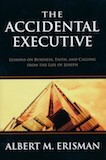Four Obstacles that Threaten Every Good Endeavor
Blog / Produced by The High Calling
In an interview with Katherine Leary Alsdorf, founder and former executive director of the Center for Faith & Work (CFW), she was asked, "What are the biggest obstacles people need to confront if they are to integrate work and faith?"
Before I give her answer, I’ll suggest that Alsdorf was a superb fit for such a question. Having spent 25 years in the corporate world and then coming to Redeemer Presbyterian Church to start and guide the CFW into a significant point of light for Christ in New York City, she knows a bit about the subject. She also knows a bit about the young professionals who constitute the core of this vibrant workplace ministry: twenty- and early-thirty-somethings pursuing business, art, law, marketing, dance, fashion. The fruit of Alsdorf’s labor at the CFW reaches thousands of people each year. She has coached them. She has listened to their struggles to integrate faith and work. And she has been there herself.
Potential roadblocks to integrating faith and work
Consider the answer she gave regarding obstacles:
"Certainly money. You need money to put a roof over your head and be a responsible provider. But we probably all hunger for things that money can buy that are not critical to a healthy, balanced life and that only make us more captive to money.
Also power. Personally, I was probably much more drawn by the power to influence things than I was by money.
The need to be liked and the need to be needed can really get in the way. Not that you should be an unlikable leader, but when you’re just wanting to be liked, you can find yourself avoiding paths of truth.
There’s also security. Many people make career decisions for security when, in fact, calling is a risky business. Living as God’s people is a risky business. If you’re always just making choices that are secure, and not taking risk, you’re not really open to the ways God could be calling you." (Read the rest of the interview here.)
As is often the case in an honest conversation, you can hear two voices in her response: one of a teacher with experience, and the other of a confessor. Alsdorf has witnessed the obstacles in her apprentices, and she knows the obstacles—to whatever degree—in her own life.
The story she tells in the foreword to Timothy Keller’s book, Every Good Endeavor, gives a moving account of her desire to lead a company to public success, only to watch it fail in surprising and sudden completeness. Power one day, surrender the next. But Alsdorf also watched as God turned the story around, eventually providing the influence she craved, yet in a way that replaced idolatry with praise. As Keller writes,
"[Queen Esther] becomes a person of greatness not by trying to make a name for herself; and you will become a person of greatness not by trying to make yourself into one, but by serving the One who said to his Father, 'For your sake, thy will be done'" (128).
These potential obstacles—money, power, the need to be liked and needed, security—they strike each of us in particular ways. When they do, we forfeit the use of our talents for the good of others and God’s kingdom.
This November and December, the Young Professionals channel will explore these four through a series of interviews and encouraging resources. Come back next week to hear a corporate banker talk about Golden Handcuffs and what gives him freedom to walk away.
In the meantime, purchase Every Good Endeavor (from Hearts & Minds Books for a discount and lengthy review), or read the insightful discussion highlights on it here at The High Calling. Then pursue your own good endeavor with all your heart, mind, soul, and strength (Mark 12:30).
Just be careful along the way.
*****
Read more of the work and faith obstacle series here:
- Four Obstacles that Threaten Every Good Endeavor
- The Businessman and the Fisherman
- Young Professionals Pick Freedom Over Money
- Wanting More Power and Getting It
- Powered by Wisdom: My Fall and Rise in the Classroom
- Insecurity at the Office
- The Danger of Securing My Future
- 'Twas the Eve of My First Job





